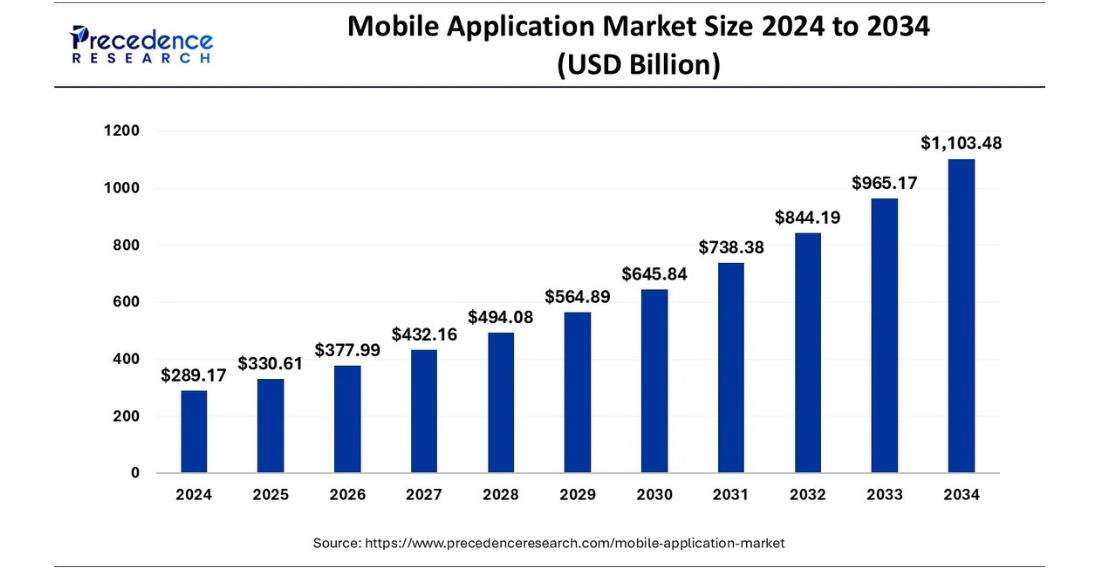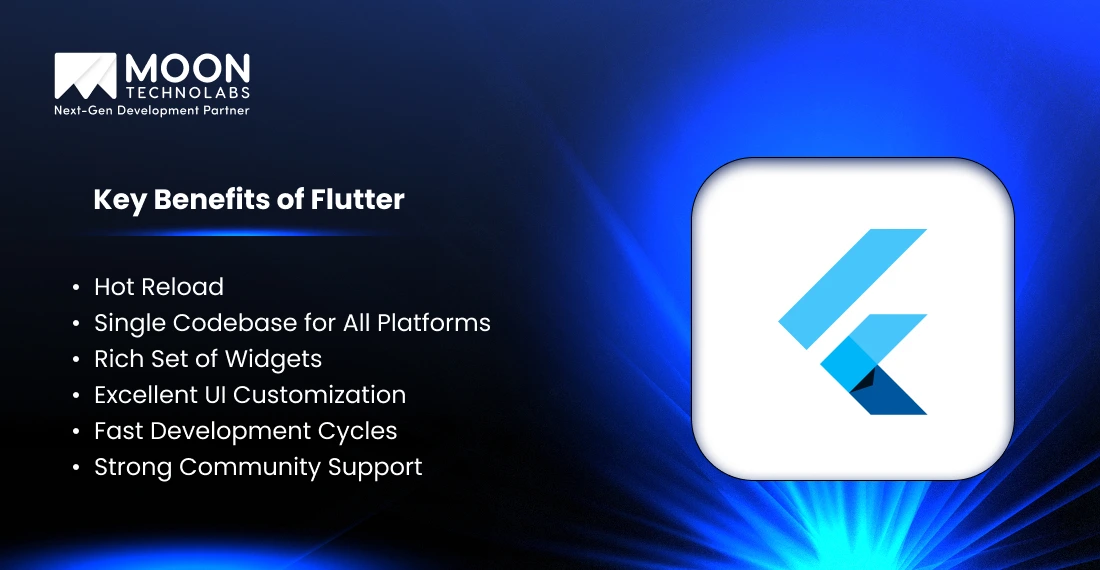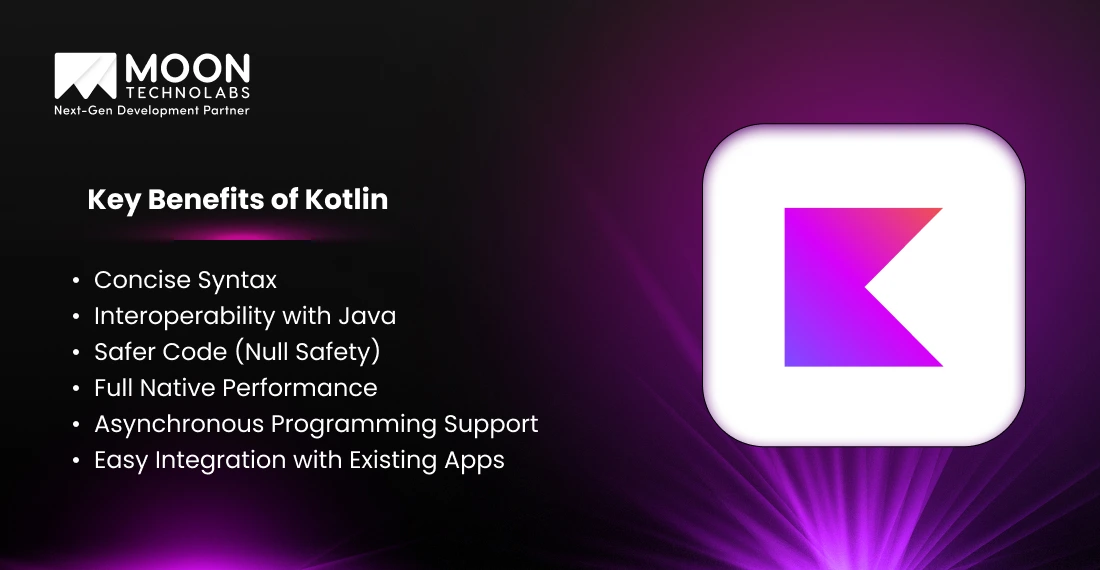Table of Content
Blog Summary:
This blog helps you opt for the right option between Flutter and Kotlin by explaining major differences between them. From benefits and use cases to different scenarios of using these frameworks, we explain the complete differences between Flutter and Kotlin . Keep reading on.
Table of Content
So, you have decided to build a mobile app for your business. It’s indeed a decisive step to streamline your business operation and improve your customer service. But, for developing mobile apps, you need to select the right technologies. Flutter and Kotlin are emerging options on this horizon and help you create a variety of high-performing, secured, and scalable apps.
Both are equally in demand with the growing app development market, which is approximately $330.61 billion in 2025 and is likely to reach up to $1103.48 billion by 2034. So, which one gains an edge, when it comes to Flutter vs Kotlin? The answer is – both are powerful technologies used for creating a variety of apps.

Flutter is the best choice for developing cross-platform and natively compiled apps. On the other hand, Kotlin emerged as the best programming language exclusively for Android app development.
In this blog, we uncover some major differences between Flutter and Kotlin to help you choose the right option for your upcoming application.
Developed and introduced by Google, Flutter is an UI software development toolkit. It’s an open-source toolkit that enables developers to create apps similar to native apps for web, mobile, and desktops. It gives developers the flexibility to use a single codebase for greeting apps.
Based on the Dart programming language, Flutter makes the mobile app development process smooth yet rapid. Developers leverage this framework to craft high-performing apps with express UI.
Flutter comes with widget-based architecture that allows the creation of visually enticing and also customizable user interfaces. It’s apt for building cross-platform apps with the ability to offer a consistent user experience across multiple platforms, be it desktop or mobile.

Flutter allows developers to create top-performing apps by using a single codebase and without taking so much time. These apps behave and perform like native apps. We uncover certain other benefits of Flutter app development:
Hot reloading allows developers to visualize any changes they make while creating any app. And for this, they don’t need to restart the app. It streamlines the overall development process with real-time experimentation, fast bug fixing, etc. It also ensures a smooth collaboration between designers and developers.
As we mentioned, Flutter lets you implement even a single codebase for creating apps for a range of platforms, whether it’s iOS or Android. It minimizes the overall development time and also maintenance efforts while offering a full of consistent in-app behavior across multiple devices.
Flutter provides a huge library of customizable widgets that follow Cupertino and Material Design. These kinds of pre-designed widgets minimize the overall complexity of the UI development process. It facilitates developers to create sophisticated interfaces fast even without starting from scratch.
Flutter boasts a vast capability of creating responsive and customized UIs. Developers get full control over every single pixel on the screen, which reflects their craft, branded, and unique experiences that are aesthetically pleasing and functional.
It supports a rendering engine called Skia, which offers a smooth transition and animation across multiple devices.
With Flutter, developers get the flexibility to blend reusable widgets, hot reload, and a unified codebase. The framework offers fast development cycles. This speed is perfect for both small and large businesses that require to launch MVPs fast or even iterate on their apps fast according to user feedback.
Flutter has an active and fast-growing global community accompanied by vast support and documentation from none other than Google. Developers get the flexibility to access even countless packages, tutorials, plugins, etc.
These speed up problem-solving and thus emphasize innovation. Community contribution is something that causes certain regular improvements and also features expansions.
Flutter is one of the top-rated cross-platform app development platforms used for developing a variety of apps. We discuss some of the top apps you can create by leveraging this framework:
Flutter is the most appropriate framework to create on-demand apps such as taxi booking, food delivery, home services, and more. It includes quick development capability with real-time functionality support.
The framework includes a rich widget library that is useful in creating intuitive user interfaces with many dynamic features such as in-app chat, geo-location tracking, payment gateways, and more. These are indeed pivotal for many on-demand platforms.
User experience and speed are something that is of great importance in the eCommerce sector. Be it fast performance or smooth UI rendering, Flutter offers everything.
It’s suitable for apps with filters, product catalogs, payment integrations, and cart systems. Developers leverage its plugins such as Stripe and Firebase to create highly secure, scalable, and feature-rich eCommerce app solutions with a native-like experience.
MVP development is in trend among businesses for letting them validate their software development ideas – Flutter helps them in this. They can leverage its single codebase attribute to minimize the overall development time and cost.
On the other hand, hot-reload features ensure fast interactions. It also enables teams to create functional prototypes with polished UIs. These necessary features lure investors.
For fintech apps, many factors are important. These include reliability, security, and real-time performance. Flutter matches these requirements and thus helps developers create impeccable apps.
Whether you wish to create apps for stock trading, mobile banking, cryptocurrency, budgeting, or others, Flutters is the best option you can consider.
Creating social media apps is a process that involves the integration of complex and high-end functionalities. These include media sharing, live chat, news feeds, push notifications, and more.
You can combine Flutter’s performance with third-party integrations and customizable widgets. That’s the reason why it’s a perfect choice for creating scalable social networking apps with responsive and engaging user interfaces.
Moon Technolabs offers experienced Flutter developers who build high-performance, cross-platform apps tailored to your business goals.
Hire Flutter Developers Now
Developed by JetBrains, Kotlin is another popular programming language that has the ability to interoperate completely with Java. It works smoothly on Java Virtual Machine (JVM) and also should be compiled perfectly to JavaScript or native code. It’s popular for various reasons such as null safety, concise syntax, express features, and more.
With Kotlin, developers write efficient and clean code. It’s the most popular and widely used programming language for developing Android apps. When you combine its robust and cutting-edge features with interoperability with the existing Java code, the programming language helps you create for backend and mobile development.

Kotlin improves developers’ productivity and experience through its expressive, modern, and safe programming features. Let’s understand several important advantages that make a most preferred language for Kotlin app development:
Kotlin comes with an expressive, clean, and concise design compared to Java. It minimizes boilerplate code and thus makes its programming convenient to read and also maintain.
Be it smart casts, type inference, or data classes, many features let developers write less code even without compromising functionality and clarity. The improved readability facilitates teams to collaborate with a higher efficiency. It minimizes the overall chance of errors.
Another major advantage of Kotlin is it brings the possibility of 100% interoperability with Java. It reflects developers leverage frameworks, Java libraries, and various tools smoothly.
Kotlin can call Java code and vice versa. It thus ensures a smooth migration of an even larger codebase. It also reduces any kind of disruption during transactions. So, better interoperability is the reason why Kotlin is a top choice when it comes to transforming legacy apps.
Java comes with NullPointerExceptions (NPEs), which is a common issue that the majority of programming languages have. Meanwhile, Kotlin doesn’t have this issue. It addresses these issues perfectly with built-in null safety.
Kotlin includes a type system that distinguishes it between both nullable and non-nullable types at a compile time. It minimizes runtime crashes mainly due to null values.
You need to keep in mind that Kotlin is not limited only to the JVM. With this programming language, you can compile it to native binaries that deliver native performance on many platforms such as Windows, iOS, macOS, Linux, and more.
This makes it a perfect choice for creating cross-platform apps without compromising efficiency or speed. Kotlin facilitates sharing code business logic across various platforms while offering platform-specific UIs.
Kotlin comes with robust coroutine support that simplifies the entire process of asynchronous programming conveniently. Coroutines eases out complications in asynchronous code by making it look like a sequential code, which enhances reliability while avoiding any callback.
They contribute effectively to managing network calls, background tasks, large data operations, etc., with a higher efficiency. It’s indeed highly important for amazing user experiences in both web and mobile apps.
Kotlin has the potential to complement your existing codebases. Whether you wish to integrate into a full-scale production app or a small utility module, Kotlin is useful for various purposes.
It’s fully compatible with many top-rated IDEs and Android Studio, which simplifies the entire integration process and makes it perfect for teams seeking to improve functionality, without working from scratch.
Kotlin is an apt programming language for creating modern app development with its safety features, concise syntax, smooth Java interoperability, and more. Since Kotlin is versatile, it’s a good option to create a variety of apps for different domains.
Following are some popular use cases of Kotlin:
Backed by Google, Kotlin is packed with features like smart casts, null safety, and reduced boilerplate code. These improve productivity and thus minimize runtime errors. Be it Trello, Pinterest, or Evernote, many popular apps are developed on Kotlin.
These apps reflect the efficiency of this programming language in creating a fully maintainable and high-performing app.
When it comes to creating enterprise solutions, Kotlin is useful for developing the backend by leveraging frameworks such as Spring Boot and Ktor. Since this programming language is compatible with the Java-based ecosystem, it’s a perfect choice for upgrading old Java apps even without rewriting them completely.
Organizations get a variety of advantages from its improved readability, team collaboration, and quick development cycles.
Whether it is stability, security, or performance, they are pivotal in the finance sector. Kotlin matches all these and thus emerged as the top choice when it comes to creating banking and fintech apps.
Most fintech organizations nowadays prefer Kotlin for creating their digital wallets, banking apps, investment platforms, etc. With the use of Kotlin, developers can prevent even common coding errors with its high-grade safety features. It ensures a fully secured user experience.
Kotlin facilitates developers to compile Kotlin code to run on a range of platforms even without a JVM, including embedded systems, iOS, and microcontrollers. It makes Kotlin a perfect option for IoT solutions where cross-platform capabilities and memory efficiency are necessary.
Developers can create sensor integration software, firmware, or even device management system apps with the use of Kotlin across a range of hardware platforms.
A quick prototyping is necessary for businesses to validate their ideas. Kotlin multiplatform enables the sharing of business logic across multiple platforms such as iOS, Android, desktop platforms, and more.
These make it a perfect choice for creating cross-platform MVP (Minimum Viable Product). It minimizes both development time and cost while maintaining native user experience and performance.
Hire dedicated Kotlin developers from Moon Technolabs to build secure, scalable, and high-performing Android applications with precision and speed.
Hire Kotlin Developers Now
Whether it’s Kotlin or Flutter, they both are robust for creating world-class apps. But, they are indeed different from each other in terms of their capabilities and approach. Let’s have a detailed overview of Flutter vs Kotlin:
Flutter
The major advantage of Flutter is that its code complies completely with native ARM code with the use of Dart AOT (Ahead-of-Time) compilation. It offers outstanding running performance.
Meanwhile, Flutter runs smoothly in its rendering engine, which includes an abstraction layer. It results in a higher memory footprint, especially when compared to many native applications.
Kotlin Multiplatform
Kotlin multiplatform shares a business logic and ensures the development of UI natively for every platform. It compiles mainly native code for JVM bytecode for Android and native code for iOS, which ensures near-native performance even without any extra rendering layer. It makes Kotlin a perfect choice for performance-oriented apps.
Flutter
With the use of its widgets and UI rendering engine, Flutter enables developers to create visually consistent UIs across a range of platforms. And for this, they don’t rely on native components. It comes with fully customizable widgets and vast rich libraries.
Kotlin
Kotlin doesn’t come with any cross-platform UI solution. It ensures the development of UI natively for every platform. It enables the right platform conformity while maximizing the development effort.
Flutter
As we discussed, Flutter is written entirely in Dart, which is not a very popular language. That’s why the learning curve for developers is high, especially for developers who are not aware of it. But, once they learn the programming language, it helps them build powerful and feature-oriented apps quickly.
Kotlin
Being a modern language, Kotlin doesn’t have a tough learning curve, especially for Android developers, since it has full interoperability with Java. Android developers find it convenient to pick up. Swift developers get the flexibility to adapt the shared business logic with lesser overhead.
Flutter
Flutter claims a vast community of adoptions for getting vast support from Google. Besides, it also comes with extensive documentation, several plugins, and active forums including GitHub and Stack Overflow.
Kotlin
Kotlin is growing fast and supported by JetBrains. Though it has a small community compared to Flutter, its support is increasing day by day as a number of organizations adopt it for production-level apps. Be it libraries or documentation, they are improving with time.
Flutter
With features like hot reloading, a unified codebase, and others, Flutter makes the development process fast. It’s indeed most appropriate for projects that have limited budgets and tight deadlines. It’s also the right option for MVP startups.
Kotlin
With Kotlin, you need to create a separate UI development for Android and iOS. It maximizes both development complexity and time. Meanwhile, it’s a good option for many larger-scale projects with complex business logic that gets advantages from platform-native UIs and shared code.
Flutter
Flutter gives you the liberty to integrate it perfectly with Android Studio, which offers widget inspection, performance profiling, etc. Besides, it also includes plugins for IntelliJ and VS Code for being accessible across a range of IDEs.
Kotlin
Kotlin of course integrates well with Android Studio, which is developed by none other than JetBrains. It provides robust debugging tools, native support, smooth project configuration, etc., for Kotlin projects.
Flutter
With Flutter, developers get flexibility for 100% code sharing across many platforms – it’s one of the top advantages. It includes business logic, UI, storage layers, and even networks.
Kotlin
Kotlin enables code sharing mainly for business logic with user interface and also several platform-specific integrations built separately. It yields more platform-native behavior but also less shared code.
You can opt for Flutter for the following scenarios;
You can choose Kotlin for your project in the following scenarios;
Now, everything is clear and you can select the right option between Flutter and Kotlin based on your core project requirements.
Supported by Google, Flutter is apt for creating cross-platform apps by implementing a single codebase. It offers a rich UI and rapid development. On the other hand, Kotlin is a good choice for Android development. If you wish to target iOS and Android quickly, you can opt for none other than Flutter.
Moreover, if you wish to create only Android apps with native performance and capabilities, you can go with Kotlin. It’s advisable to determine your platform targets, timelines and desired user experience to decide the right tool for your overall development journey.
Our expert developers at Moon Technolabs can guide you to the right tech stack and deliver custom mobile solutions tailored to your needs.
Talk to a Mobile App Expert
We already made it clear that the selection of the right option between Flutter and Kotlin solely depends on your project requirements and objectives. You should also keep in mind the desired user experience, team expertise, etc. to make the right selection.
As a leading mobile app development company, Moon Technolabs helps you make the right selection by analyzing your app development ideas, the type of app you wish to create, the features you wish to integrate, and more.
We have 15+ years of experience in leveraging Kotlin and Flutter and creating powerful apps based on our client’s core business objectives. Let’s get in touch to discuss your requirements.
01
02
03
04
05
Submitting the form below will ensure a prompt response from us.